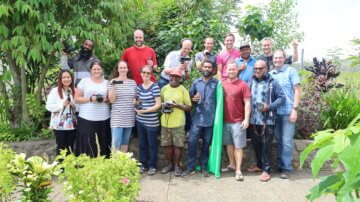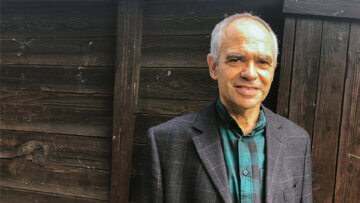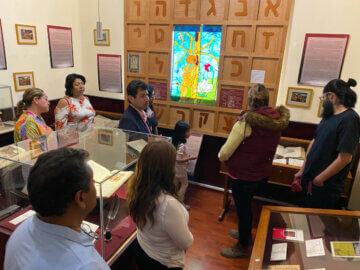Joyful Service in the Midst of Hardship
Stories to encourage and strengthen – Wycliffe World Day of Prayer 2021
John Ommani is the Regional Programmes Manager for the coast region of Bible Translation and Literacy (BTL). In 1997, the BTL leadership asked him to work with the Sabaot committee to plan for the launch of the Sabaot New Testament. John had to make a long journey to Mt. Elgon to meet with the committee, and decided to visit his father in the hospital along the way.
"When I arrived in Kakamega with my wife and sister, we went to the hospital to check on my father. I prayed with him. When I finished praying, my father told me, 'You go ahead with your journey because God has called you to serve him, but when you come back, prepare to host visitors; there will be many.' John dashed home to inform his stepmother that she needed to be at the hospital. Because of the way his father had spoken to him, it seemed like he was not going to live much longer.
While his mother and sister rushed back to the hospital to be with his father, he continued with his 11-hour journey to Mt. Elgon. Due to the lack of transport, Ommani had to walk the final 20 kilometers. When he arrived at Kopsiro, a small village in Mt. Elgon, the first person he met said, “Why are you here? Don't you know that your father has passed on?” "I was shocked, Omani said. “Unknown to me my father had passed on thirty minutes after I left the hospital."
Ommani travelled back home to bury his father. After that event, he returned to Mt Elgon to continue planning for the launch. "When the moment came for the Bibles to be brought to the launch venue, I forgot all the pain I had gone through,” he said. “I forgot all the sad moments that I had experienced. When the women came dancing and singing carrying the Bibles, it was a joyous moment to behold. I broke down in tears. I went behind a tree and wept. I knew what that moment meant to a community. It was as if Psalm 126 was being acted out before me."
Fast forward to the launch plans for the Duruma New Testament in the year 2000. Two days before the launch event, John received the sad news that his second elder sister had passed on. "The death of my sister forced me to a place of deep reflection. I asked myself what it was about launches, that every time I was planning for one, a family member had to die."
The death of his loved ones, sleeping in the car because he could not find a place to sleep, travelling on a lorry, sleeping while hungry were some of the hardships he had to endure during the facilitation of Bible translation. These never deterred John from sharing God's Word with the people he was called to serve.
In his role Ommani assisted in the planning of six Bible launches. Each one of them had a happy ending that came after some hard moments along the way.
"As I look back, in each of those situations, I realized that it is not easy for people to access God's Word in their language,” he said. “The joy of it all is that from those painful moments, God started to speak to me from the Book of Ephesians 4:11-16. We do what we do so that God's people can have access to His Word; to read it, to be grounded in it so that they are no-longer ‘tossed around’ [by false teaching]. It became vivid to me that what I was doing was not going to be easy. I thank God for the lessons, experiences and training that I received at BTL. All of these shaped me to serve and contribute at the international level as the Scripture Access Services Director for SIL International.”
Click to return to:
The latest
View all articles
03/2024 Pacific: Papua New Guinea
Informing, teaching, inspiring: PNG workshop teaches video storytelling for language communities
PNG workshop teaches video storytelling for language communities
Read more
02/2024 Global
Looking ahead at 2024
As the year unfolds, we marvel at the work of God in our rapidly changing world. And, we look forward to a number of gatherings and conversations intended to draw us together.
Read more
01/2024 Americas
Telling the Bible's Story
It may come as a surprise that a museum is among the Wycliffe Global Alliance organisations.
Read more